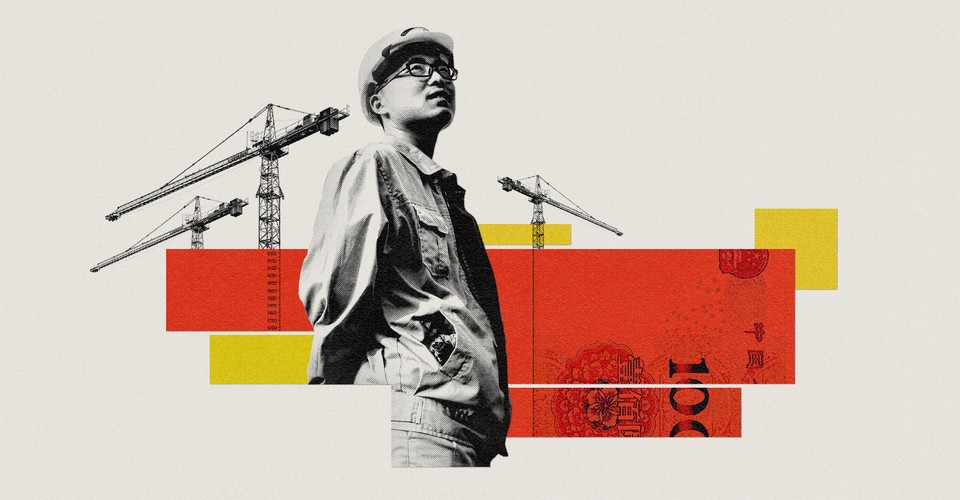Do you do anything other than repeat easily disputed propaganda? Are you talking about the Hambantota port? You obviously didn't bother to read the article I linked. Not surprising since all of your knowledge is garbage and based on hysteria and emotion rather than actual facts.
If you read the article, you would've seen this.
The prime example of this is the Sri Lankan port of Hambantota. As the story goes, Beijing pushed Sri Lanka into borrowing money from Chinese banks to pay for the project, which had
no prospect of commercial success. Onerous terms and feeble revenues eventually pushed Sri Lanka into default, at which point Beijing
demanded the port as collateral, forcing the Sri Lankan government to surrender control to a Chinese firm.
The Trump administration pointed to Hambantota to warn of China’s strategic use of debt: In 2018, former Vice President Mike Pence called it “
debt-trap diplomacy”—a phrase he used through
the last days of the administration—and evidence of China’s military ambitions. Last year, erstwhile Attorney General William Barr raised the case to
argue that Beijing is “loading poor countries up with debt, refusing to renegotiate terms, and then taking control of the infrastructure itself.”
As Michael Ondaatje, one of Sri Lanka’s greatest chroniclers, once said, “In Sri Lanka a well-told lie is worth a thousand facts.” And the debt-trap narrative is just that: a lie, and a powerful one.
Our research shows that Chinese banks are willing to restructure the terms of existing loans and have never actually seized an asset from any country, much less the port of Hambantota. A Chinese company’s acquisition of a majority stake in the port was a cautionary tale, but it’s not the one we’ve often heard. With a new administration in Washington, the truth about the widely, perhaps willfully, misunderstood case of Hambantota Port is long overdue.
The city of Hambantota lies at the southern tip of Sri Lanka, a few nautical miles from the busy
Indian Ocean shipping lane that accounts for nearly all of the ocean-borne trade between Asia and Europe, and more than 80 percent of ocean-borne global trade. When a Chinese firm snagged the contract to build the city’s port, it was stepping into an ongoing Western competition, though one the United States had largely abandoned.
It was the Canadian International Development Agency—not China—that financed Canada’s leading engineering and construction firm, SNC-Lavalin, to carry out a feasibility study for the port. We obtained more than 1,000 pages of documents detailing this effort through a Freedom of Information Act request. The study, concluded in 2003, confirmed that building the port at Hambantota was feasible, and supporting documents show that the Canadians’ greatest fear was losing the project to European competitors. SNC-Lavalin recommended that it be undertaken through a joint-venture agreement between the Sri Lanka Ports Authority (SLPA) and a “private consortium” on a build-own-operate-transfer basis, a type of project in which a single company receives a contract to undertake all the steps required to get such a port up and running, and then gets to operate it when it is.
The Canadian project failed to move forward, mostly because of the vicissitudes of Sri Lankan politics. But the plan to build a port in Hambantota gained traction during the rule of the Rajapaksas—Mahinda Rajapaksa, who served as president from 2005 through 2015, and his brother Gotabaya, the current president and former minister of defense—who grew up in Hambantota. They
promised to bring big ships to the region, a call that gained urgency after the devastating 2004 tsunami pulverized Sri Lanka’s coast and the local economy.
We reviewed a second feasibility report, produced in 2006 by the Danish engineering firm Ramboll, that made similar recommendations to the plans put forward by SNC-Lavalin, arguing that an initial phase of the project should allow for the transport of non-containerized cargo—oil, cars, grain—to start bringing in revenue, before expanding the port to be able to handle the traffic and storage of traditional containers. By then, the port in the capital city of Colombo, a hundred miles away and consistently one of the world’s busiest, had just expanded and was already pushing capacity. The Colombo port, however, was smack in the middle of the city, while Hambantota had a hinterland, meaning it offered greater potential for expansion and development.
To look at a map of the Indian Ocean region at the time was to see opportunity and expanding middle classes everywhere. Families in India and across Africa were demanding more consumer goods from China. Countries such as Vietnam were growing rapidly and would need more natural resources. To justify its existence, the port in Hambantota would have to secure only a fraction of the cargo that went through Singapore, the world’s busiest transshipment port.
Armed with the Ramboll report, Sri Lanka’s government
approached the United States and India; both countries said no. But a Chinese construction firm, China Harbor Group, had learned about Colombo’s hopes, and lobbied hard for the project. China Eximbank agreed to fund it, and China Harbor won the contract.
This was in 2007, six years before Xi Jinping introduced the Belt and Road Initiative. Sri Lanka was still in the last, and bloodiest, phase of its long civil war, and the world was on the verge of a financial crisis. The details are important: China Eximbank offered a $307 million, 15-year commercial loan with a four-year grace period, offering Sri Lanka a choice between a 6.3 percent fixed interest rate or one that would rise or fall depending on
LIBOR, a floating rate. Colombo chose the former, conscious that global interest rates were trending higher during the negotiations and hoping to lock in what it thought would be favorable terms. Phase I of the port project was completed on schedule within three years.
For a conflict-torn country that struggled to generate tax revenue, the terms of the loan seemed reasonable. As Saliya Wickramasuriya, the former chairman of the SLPA, told us, “To get commercial loans as large as $300 million during the war was not easy.” That same year, Sri Lanka also issued its first international bond, with
an interest rate of 8.25 percent. Both decisions would come back to haunt the government.
Finally, in 2009, after decades of violence, Sri Lanka’s civil war came to an end. Buoyed by the victory, the government embarked on a debt-financed push to build and improve the country’s infrastructure. Annual economic growth rates climbed to 6 percent, but Sri Lanka’s debt burden soared as well.
In Hambantota, instead of waiting for phase 1 of the port to generate revenue as the Ramboll team had recommended, Mahinda Rajapaksa pushed ahead with phase 2, transforming Hambantota into a container port. In 2012, Sri Lanka borrowed another $757 million from China Eximbank, this time at a reduced, post-financial-crisis interest rate of 2 percent. Rajapaksa took the liberty of naming the port after himself.
By 2014, Hambantota was losing money. Realizing that they needed more experienced operators, the SLPA signed an agreement with China Harbor and China Merchants Group to have them jointly develop and operate the new port for 35 years. China Merchants was already operating a new terminal in the port in Colombo, and China Harbor had invested $1.4 billion in Colombo Port City, a lucrative real-estate project involving land reclamation. But while the lawyers drew up the contracts, a political upheaval was taking shape.
Rajapaksa called a surprise election for January 2015 and in the final months of the campaign, his own health minister, Maithripala Sirisena, decided to challenge him. Like opposition candidates in Malaysia, the Maldives, and Zambia, the incumbent’s financial relations with China and allegations of corruption made for potent campaign fodder. To the country’s shock, and perhaps his own, Sirisena won.
Steep payments on international sovereign bonds, which comprised nearly 40 percent of the country’s external debt, put Sirisena’s government in dire fiscal straits almost immediately. When Sirisena took office, Sri Lanka
owed more to Japan, the World Bank, and the Asian Development Bank than to China. Of the $4.5 billion in debt service Sri Lanka would pay in 2017,
only 5 percent was because of Hambantota. The Central Bank governors under both Rajapaksa and Sirisena do not agree on much, but they both told us that Hambantota, and Chinese finance in general, was not the source of the country’s financial distress.
There was also never a default. Colombo arranged a
bailout from the International Monetary Fund, and decided to raise much-needed dollars by leasing out the underperforming Hambantota Port to an experienced company—just as the Canadians had recommended. There was not an open tender, and the only two bids came from China Merchants and China Harbor; Sri Lanka chose China Merchants, making it the majority shareholder with a 99-year lease, and used the $1.12 billion cash infusion to bolster its foreign reserves, not to pay off China Eximbank.
Before the port episode, “Sri Lanka could sink into the Indian Ocean and most of the Western world wouldn’t notice,” Subhashini Abeysinghe, research director at Verité Research, an independent Colombo-based think tank, told us. Suddenly, the island nation featured prominently in foreign-policy speeches in Washington. Pence voiced worry that Hambantota could become a “forward military base” for China.
Yet Hambantota’s location is strategic only from a business perspective: The port is cut into the coast to avoid the Indian Ocean’s heavy swells, and its narrow channel allows only one ship to enter or exit at a time, typically with the aid of a tugboat. In the event of a military conflict, naval vessels stationed there would be proverbial fish in a barrel.
The notion of “debt-trap diplomacy” casts China as a conniving creditor and countries such as Sri Lanka as its credulous victims. On a closer look, however, the situation is far more complex. China’s march outward, like its domestic development, is probing and experimental, a learning process marked by frequent adjustment. After the construction of the port in Hambantota, for example, Chinese firms and banks learned that strongmen fall and that they’d better have strategies for dealing with political risk. They’re now developing these strategies, getting better at discerning business opportunities and
withdrawing where they know they can’t win. Still, American leaders and thinkers from both sides of the aisle give speeches about China’s “
modern-day colonialism.”













